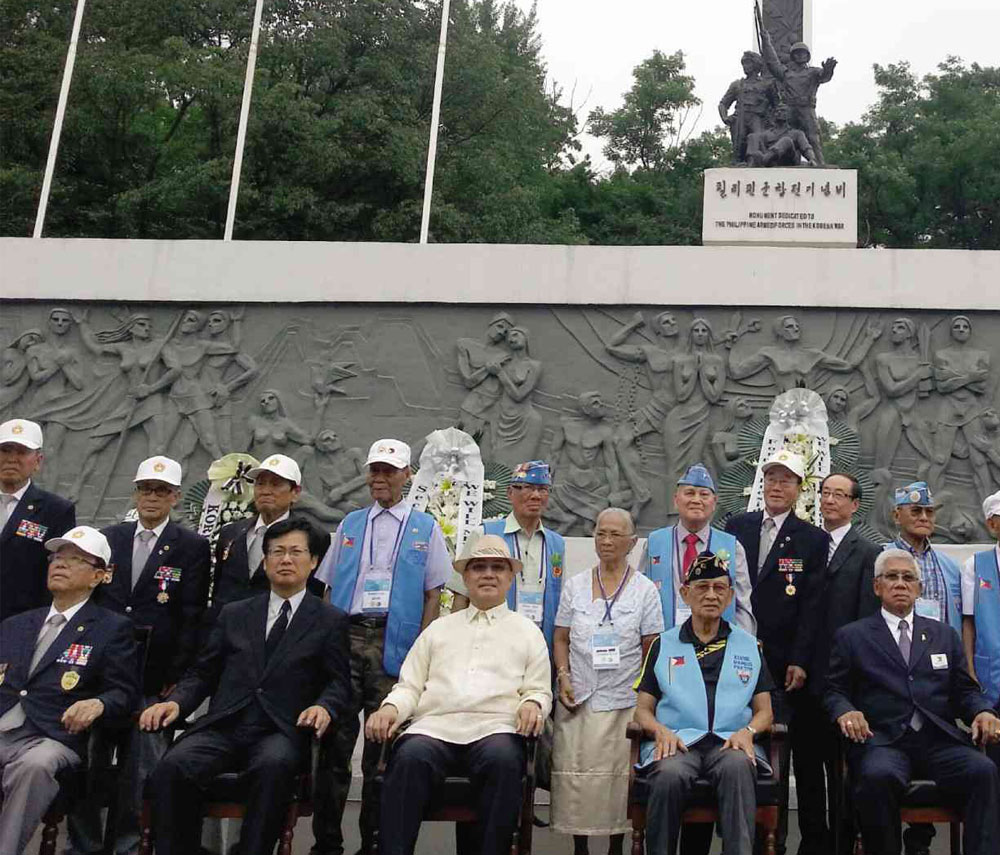
PH MONUMENT Former President Fidel V. Ramos (seated, in blue vest) leads fellow Filipino veterans of the Korean War in wreath-laying rites at the Philippine Monument in Goyang City, 35 kilometers north of Seoul. NIKKO DIZON
SEOUL—For retired Filipino soldiers who fought in Korea, Vietnam and at home, war is not a solution to conflicts.
Sixty years after the war on the Korean Peninsula came to a ceasefire, the Filipino veterans, who joined their colleagues from the United Nations forces to commemorate the event, lamented the fighting and the loss of lives.
“It makes you feel that there should be no war. It’s meaningless and wrong. We can settle conflicts in a better way,” retired Col. Ishmael Rodrigo told the Inquirer.
The death toll from the Korean War was placed at 2.5 million North and South Koreans and UN allied forces.
Aside from Rodrigo, those who returned to Korea over the weekend to join the commemoration of the armistice signing on Saturday were former President Fidel Ramos, retired Generals Benjamin Santos and Prudencio Regis, Colonels Vicente Alhambra and Jovencio Dominguez and Lieutenants Dionisio Layaoen and Severino Aquino.
Despite facing the Hukbalahap rebellion, then President Elpidio Quirino approved the sending of the Philippine Expeditionary Forces to Korea that included his son and a son-in-law. The Philippines sent a total of 7,420 combat troops and lost 112 men, with 16 listed as missing in action.
Rodrigo, 87, fought as a young guerrilla in World War II, Korean War, Vietnam War and the campaign against the Huks.
Santos, 85, said fighting the Huks was more difficult than facing foreign enemies.
But by and large, “you don’t like to kill [anyone], being a Christian,” he added.
But if one is face to face with the enemy, one has to make a decision.
Ramos, then a 25-year-old Army lieutenant in the Korean War, remembered having to shoot at a Chinese soldier at close range in the Battle of Hill Eerie.
“He was already going to pull the pin of a grenade and throw it at us. I had no choice but to shoot him,” recalled Ramos, who commanded the reconnaissance team that was deployed to the area. (Ramos was part of the 20th Battalion Combat Team, not 29th BCT as reported by the Inquirer on Sunday.)
Ramos said a number of the Filipino troops engaged in hand-to-hand combat with the enemy.
Santos said another proud moment for the Filipino soldiers was when the 20th BCT and 19th BCT were able to repulse the “major offensive brigade of the Chinese communists.”
It happened on June 21-22, 1952, Santos said. “We were all told to hold the line. The Chinese already blew the bugle and sent pyrotechnic signals [to rally the soldiers] and they attacked, but the Filipinos were able to hold the line. We were on the front line with our .50-cal. machine guns and M1 rifle carbines. That was the bravery and gallantry in action of the Filipinos,” Santos said.
The war was made more difficult for the Filipinos because of the brutal winter and the mountainous terrain.
The Filipino veterans who attended the Peace Concert on Friday at Dorasan Station could hardly recognize the area where they fought alongside other UN allied forces to repel the North Koreans and the Chinese.
“But I am certain the area is just somewhere there,” Alhambra said, pointing through the glass windows of the station that led to North Korea.
Alhambra, now 97, was the intelligence officer who Ramos said taught him his first two Korean phrases: “Kamsahamnida (Thank you very much)” and “Saranghamnida (I love you).”
Fear of dying, even not in one’s own country, should not cross the mind of a soldier trained to fight in a war, Alhambra said.
The veterans remember vividly the names of their comrades who died in battle, even their assignments.
“What is also difficult to forget were the unholy hours that we were awake keeping guard. And sometimes, when your soldiers are captured or wounded—that was your worry. You also worry that you would not be taken by the enemy and you have to prepare for the defense,” said Alhambra, a graduate of the Philippine Military Academy Class of 1942.
His son Vicente Jr., who accompanied him to Korea, said he could not forget a photograph of his father taken at a camp opening a bottle of beer with his .45-cal. pistol.
Crescencia Felicia also cannot forget the day her husband, the late Lt. Maximino Felicia, was about to leave for Korea. He was already at the port waiting to board the ship when she went into labor for the birth of their eldest child.
Word got to Maximino, who was in his mid-20s at the time, who ran to his wife’s side and stayed with her until she gave birth. After seeing his newborn son, Maximino ran back to the port and made it in time for the ship’s departure.
He was 4’9” tall, but Maximino earned the nickname “Thick Boy” in Korea because of his bulky build.
Why did she allow her husband to leave? Crescencia, 82, smiled and said: “Because he wanted to fight for all of us.”
“During our time, we knew how much we would contribute to the rest of the world, as we were part of a bigger community, unlike now when young people would first ask what their compensation would be for doing something beyond the call of duty,” Santos said.

